- Home
- Vladimir Nabokov
King, Queen, Knave Page 2
King, Queen, Knave Read online
Page 2
It was a second-class Schnellzug car, and to Franz second-class was something brightly attractive, even slightly sinful, smacking of spicy extravagance like a sip of thick white liqueur or that enormous grapefruit resembling a yellow skull that he had once bought on the way to school. About first-class one could not dream at all—that was for diplomats, generals, and almost unearthly actresses! Second, though … second.… If he could only get up the courage. They said his late father (a seedy notary) had on occasion—long ago, before the war—travelled second-class. Yet, Franz could not make up his mind. He stopped at the beginning of the corridor, by the placard listing the car inventory, and now it was no longer a fence-like forest glancing by but vast meadows majestically gliding past, and, in the distance, parallel to the tracks, flowed a highway, along which sped lickety-split a lilliputian automobile.
The conductor just then making his rounds brought him out of his difficulty. Franz bought a supplement promoting his ticket to the next rank. A short tunnel deafened him with its resounding darkness. Then it was light again but the conductor had vanished.
The compartment that Franz entered with a silent unacknowledged bow was occupied by only two people—a handsome bright-eyed lady and a middle-aged man with a clipped tawny mustache. Franz hung up his raincoat and sat down carefully. The seat was so soft; there was such a cosy semi-circular projection at temple level separating one seat from the next; the photographs on the wall were so romantic—a flock of sheep, a cross on a rock, a waterfall. He slowly stretched out his long legs, slowly took a folded newspaper from his pocket. But he was unable to read. Benumbed with luxury he merely held the newspaper open and from behind it examined his fellow travellers. Oh, they were charming. The lady wore a black suit and a diminutive black hat with a little diamond swallow. Her face was serious, her eyes cold, a little dark down, the sign of passion, glistened above her upper lip, and a gleam of sun brought out the creamy texture of her neck at the throat with its two delicate transverse lines as if traced with a fingernail across it, one above the other: also a token of all kinds of marvels, according to one of his schoolmates, a precocious expert. The man must be a foreigner, judging by his soft collar and tweeds. Franz, however, was mistaken.
“I’m thirsty,” said the man with a Berlin accent. “Too bad there’s no fruit. Those strawberries were positively dying to be sampled.”
“It’s your own fault,” answered the lady in a displeased voice, adding a little later: “I still cannot get over it—it was such a silly thing to do.”
Dreyer briefly cast up his eyes to a makeshift heaven and made no reply.
“It’s your own fault,” she repeated and automatically pulled at her pleated skirt, automatically noticing that the awkward young man with the glasses who had appeared in the door corner seemed to be fascinated by the sheer silk of her legs.
“Anyway,” she said, “it’s not worth discussing.”
Dreyer knew that his silence irritated Martha unspeakably. There was a boyish gleam in his eye, and the soft folds about his lips were undulating because he was rolling a mint in his mouth. The incident that had irritated his wife was actually pretty silly. They had spent August and half of September in Tyrol, and now, on the way home, had stopped for a few days on business in that quaint little town, and there he had called on his cousin Lina with whom he had danced in his youth, some twenty-five years ago. His wife had flatly refused to accompany him. Lina, now a roly-poly creature with false teeth but just as talkative and amiable as ever, found that the years had left their mark on him but that it might have been worse; she served him excellent coffee, told him about her children, said she was sorry they were not at home, asked about Martha (whom she did not know) and his business (about which she was well informed); then, after a pious pause, she wondered if he could give her a piece of advice.…
It was warm in the room where around the aged chandelier, with gray little glass pendants like dirty icicles, flies were describing parallelograms, lighting every time on the same pendants (which for some reason amused him), and the old chairs extended their plush-covered arms with comical cordiality. An old pug dozed on an embroidered cushion. In reply to the expectant interrogatory sigh of his cousin he had suddenly said, coming to life with a laugh: “Well, why don’t you have him come to see me in Berlin? I’ll give him a job.” And that was what his wife could not forgive him. She called it “swamping the business with poor relations”; but when you come down to it, how can one poor relation swamp anything? Knowing that Lina would invite his wife, and that Martha would not go in any circumstance, he had lied, telling his cousin that they were leaving the same evening. Instead, Martha and he had visited a fair and the splendid vineyards of a business friend. A week later at the station, when they had already settled down in their compartment, he had glimpsed Lina from the window. It was a wonder they had not run into her somewhere in town. Martha wanted to avoid her seeing them at all cost, and even though the idea of buying a nest of fruit for the trip appealed to him greatly he did not put his head out of the window, did not beckon with a soft “psst” the young vendor in the white jacket.
Comfortably dressed, in perfect health, a colored mist of vague pleasant thoughts in his head and a peppermint in his mouth, Dreyer sat with crossed arms, and the soft folds of the fabric in the crook of his arms matched the soft folds of his cheeks, and the outline of his clipped mustache, and the wrinkles fanning templeward from his eyes. With a peculiar blandly amused gleam in his eyes he gazed from under his brows at the green landscape gliding in the window, at Martha’s handsome profile rimmed with sunlight, and the cheap suitcase of the bespectacled young man who was reading a newspaper in the corner by the door. Idly he considered that passenger, palpating him from all sides. He noted the so-called “lizard” pattern of the young fellow’s green-and-garnet tie which obviously had cost ninety-five pfennigs, the stiff collar, and also the cuffs and front of his shirt—a shirt incidentally which only existed in an abstract form since all its visible parts, judging by a treacherous gloss, were pieces of starched armor of rather low quality but greatly esteemed by a frugal provincial who attaches them to an invisible undergarment made at home of unbleached cloth. As to the young man’s suit, it evoked a delicate melancholy in Dreyer as he reflected not for the first time on the pathetically short life of every new cut: that kind of three-button, narrow-lapelled blue jacket with a pin stripe had disappeared from most Berlin stores at least five years ago.
Two alarmed eyes were suddenly born in the lenses, and Dreyer turned away. Martha said:
“It is all so silly. I wish you had listened to me.”
Her husband sighed and said nothing. She wanted to go on—there were still lots of pithy rebukes she could make but she felt the young man was listening and, instead of words, leaned her elbow abruptly on the window side of the table leaf—pulling up the skin of her cheek with her knuckles. She sat that way until the flicker of woods in the window became irksome; she slowly straightened her ripe body, annoyed and bored, then leaned back and closed her eyes. The sun penetrated her eyelids with solid scarlet, across which luminous stripes moved in succession (the ghostly negative of the passing forest), and a replica of her husband’s cheerful face, as if slowly rotating toward her, got mixed up in this barred redness, and she opened her eyes with a start. Her husband, however, was sitting relatively far, reading a book bound in purple morocco. He was reading attentively and with pleasure. Nothing existed beyond the sunlit page. He turned the page, looked around, and the outside world avidly, like a playful dog waiting for that moment, darted up to him with a bright bound. But pushing Tom away affectionately, Dreyer again immersed himself in his anthology of verse.
For Martha that frolicsome radiance was simply the stuffy air in a swaying railway car. It is supposed to be stuffy in a car: that is customary and therefore good. Life should proceed according to plan, straight and strict, without freakish twists and wiggles. An elegant book is all right on a drawing-room table. In a ra
ilway car, to allay boredom, one can leaf through some trashy magazine. But to imbibe and relish … poems, if you please … in an expensive binding … a person who calls himself a businessman cannot, must not, dare not act like that. But for that matter, perhaps, he may be doing it on purpose, to spite me. Just another of his show-off whims. Very well, my friend, keep showing off. How nice it would be to pluck that book out of his hands and lock it up in a suitcase.
At that instant the sun seemed to lay bare her face, flowing over her smooth cheeks and lending an artificial warmth to her eyes with their large elastic-looking pupils amid the dove-gray iris and adorable dark lids slightly creased like violets, radiantly lashed and rarely blinking as if she were constantly afraid of losing sight of an essential goal. She wore almost no make-up—only in the minute transverse fissures of her full lips there seemed to be drying traces of orange-red paint.
Franz, who had been hiding behind his newspaper in a state of blissful nonexistence, living on the outside of himself, in the chance motions and chance words of his travelling companions, now started to assert himself and openly, almost arrogantly, looked at the lady.
Yet only a moment ago his thoughts, always tending to morbid associations, had blended, in one of those falsely harmonious images that are significant within the dream but meaningless when one recalls it, two recent events. The transition from the third-class compartment, where a noseless monster reigned in silence, into this sunny plush room appeared to him like the passage from a hideous hell through the purgatory of the corridors and intervestibular clatter into a little abode of bliss. The old conductor who had punched his ticket a short while ago and promptly vanished might have been as humble and omnipotent as St. Peter. Pious popular prints that had frightened him in childhood came to life again. He transformed the conductor’s click into that of a key unlocking the gates of paradise. So a grease-painted gaudy-faced actor in a miracle play passes across a long stage divided into three parts, from the jaws of the devil into the shelter of angels. And Franz, in order to drive away the old obsessive fantasy, eagerly started to seek human, everyday tokens that would break the spell.
Martha helped him. While looking sideways out of the window she yawned: he glimpsed the swell of her tense tongue in the red penumbra of her mouth and the flash of her teeth before her hand shot up to her mouth to stop her soul from escaping; whereupon she blinked, dispersing a tickling tear with the beat of her eyelashes. Franz was not one to resist the example of a yawn, especially one that resembled somehow those luscious lascivious autumn strawberries for which his hometown was famous. At the moment when, unable to overcome the force prying his palate, he convulsively opened his mouth, Martha happened to glance at him, and he realized, snarling and weeping, that she realized he had been looking at her. The morbid bliss he had shortly before experienced as he looked at her dissolving face now turned into acute embarrassment. He knit his brows under her radiant and indifferent gaze and, when she turned away, mentally calculated, as though his fingers had rattled across the counters of a secret abacus, how many days of his life he would give to possess this woman.
The door slid open, and an excited waiter, the herald of some frightful disaster, thrust his head in, barked his message, and dashed on to the next compartment to cry his news.
Basically Martha was opposed to those fraudulent frivolous meals, with the railway company charging you exorbitant prices for mediocre food, and this almost physical sensation of needless expense, mixed with the feeling that someone, snug and robust, wanted to cheat her proved to be so strong that were it not for a ravenous hunger she would certainly not have gone that long vacillating way to the dining car. She vaguely envied the bespectacled young man who reached into the pocket of his raincoat hanging beside him and pulled out a sandwich. She got up and took her handbag under her arm. Dreyer found the violet ribbon in his book, marked his page with it, and after waiting a couple of seconds as if he could not immediately make the transition from one world to the other, gave his knees a light slap and stood up too. He instantly filled the whole compartment, being one of those men who despite medium height and moderate corpulence create an impression of extraordinary bulk. Franz retracted his feet. Martha and her husband lurched past him and went out.
He was left alone with his gray sandwich in the now spacious compartment. He munched and gazed out of the window. A green bank was rising there diagonally until it suffused the window to the top. Then, resolving an iron chord, a bridge banged overhead and instantly the green slope vanished and open country unfurled—fields, willows, a golden birch tree, a winding brook, beds of cabbage. Franz finished his sandwich, fidgeted cozily, and closed his eyes.
Berlin! In that very name of the still unfamiliar metropolis, in the lumber and rumble of the first syllable and in the light ring of the second there was something that excited him like the romantic names of good wines and bad women. The express seemed already to be speeding along the famous avenue lined for him with gigantic ancient lindens beneath which seethed for him a flamboyant crowd. The express sped past those lindens grown so luxuriantly out of the avenue’s resonant name, and (“derlin, derlin” went the bell of the waiter summoning belated diners) shot under an enormous arch ornamented with mother-of-pearl spangles. Farther on there was an enchanting mist where another picture postcard turned on its stand showing a translucent tower against a black background. It vanished, and, in a brilliantly lit-up emporium, among gilded dummies, limpid mirrors, and glass counters, Franz strolled about in cut-away, striped trousers, and white spats, and with a smooth movement of his hand directed customers to the departments they needed. This was no longer a wholly conscious play of thought, nor was it yet a dream; and at the instant that sleep was about to trip him up, Franz regained control of himself and directed his thoughts according to his wishes. He promised himself a lone treat that very night. He bared the shoulders of the woman that had just been sitting by the window, made a quick mental test (did blind Eros react? clumsy Eros did, unsticking its folds in the dark); then, keeping the splendid shoulders, changed the head, substituting for it the face of that seventeen-year-old maid who had vanished with a silver soup ladle almost as big as she before he had had time to declare his love; but that head too he erased and, in its place, attached the face of one of those bold-eyed, humid-lipped Berlin beauties that one encounters mainly in liquor and cigarette advertisements. Only then did the image come to life: the bare-bosomed girl lifted a wine glass to her crimson lips, gently swinging her apricot-silk leg as a red backless slipper slowly slid off her foot. The slipper fell off, and Franz, bending down after it, plunged softly into dark slumber. He slept with mouth agape so that his pale face presented three apertures, two shiny ones (his glasses) and one black (his mouth). Dreyer noticed this symmetry when an hour later he returned with Martha from the dining car. In silence they stepped over a lifeless leg. Martha put her handbag on the collapsible window table, and the bag’s nickel clasp with its cat’s eye immediately came to life as a green reflection began dancing in it. Dreyer took out a cigar but did not light it.
The dinner, particularly that wiener schnitzel, had turned out to be pretty good, and Martha was not sorry now that she had agreed to go. Her complexion had grown warmer, her exquisite eyes were moist, her freshly painted lips glistened. She smiled, only just baring her incisors, and this contented, precious smile lingered on her face for several instants. Dreyer lazily admired her, his eyes slightly narrowed, savoring her smile as one might an unexpected gift, but nothing on earth could have made him show that pleasure. When the smile disappeared he turned away as a satisfied gawker drifts away after the bicyclist has picked himself up, and the street vendor has replaced on his cart the scattered fruit.
Franz crossed his legs like one very lame and slow but did not wake up. Harshly the train began braking. There glided past a brick wall, an enormous chimney, freight cars standing on a siding. Presently it grew dark in the compartment: they had entered a vast domed station.
“I’ll go out, my love,” said Dreyer, who liked to smoke in the open air.
Left alone, Martha leaned back in the corner, and having nothing better to do looked at the bespectacled corpse in the corner, thinking indifferently that this, perhaps, was the young man’s stop and he would miss it. Dreyer strode along the platform, drummed with five fingers on the windowpane as he passed, but his wife did not smile again. With a puff of smoke he moved on. He strolled leisurely, with a bouncing gait, his hands clasped behind his back, and his cigar thrust forward. He reflected that it would be nice some day to be promenading like this beneath the glazed arches of a remote station somewhere on the way to Andalusia, Bagdad or Nizhni Novgorod. Actually one could set off any time; the globe was enormous and round, and he had enough spare cash to circle it completely half-a-dozen times. Martha, though, would refuse to come, preferring a trim suburban lawn to the most luxuriant jungle. She would only sniff sarcastically were he to suggest they take a year off. “I suppose,” he thought, “I ought to buy a paper. I guess the stock market is also an interesting and tricky subject. And let us see if our two aviators—or is it some wonderful hoax?—have managed to duplicate in reverse direction that young American’s feat of four months ago. America, Mexico, Palm Beach. Willy Wald was there, wanted us to accompany him. No, there is no breaking her down. Now then, where is the newsstand? That old sewing machine with its arthritic pedal wrapped up in brown paper is so clear right now, and yet in an hour or two I shall forget it forever; I shall forget that I looked at it; I shall forget everything.…” Just then a whistle blew, and the baggage car moved. Hey, that’s my train!
Dreyer made for the newsstand at a smart trot, selected a coin from his palm, snatched the paper he wanted, dropped it, retrieved it, and dashed back. Not very gracefully, he hopped onto a passing step, and could not open the door immediately. In the struggle he lost his cigar but not his paper. Chuckling and panting, he walked through one car, another, a third. In the next to last corridor a big fellow in a black overcoat who was pulling a window shut moved to let him by. Glancing at him as he passed, Dreyer saw the grinning face of a grown man with the nose of a baby monkey. “Curious,” thought Dreyer; “ought to get such a dummy to display something funny.” In the next car he found his compartment, stepped across the lifeless leg, by now a familiar fixture, and quietly sat down. Martha was apparently asleep. He opened the paper, and then noticed that her eyes were fixed upon him.

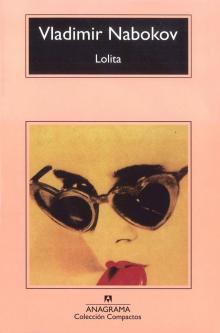 Lolita
Lolita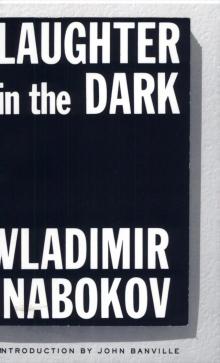 Laughter in the Dark
Laughter in the Dark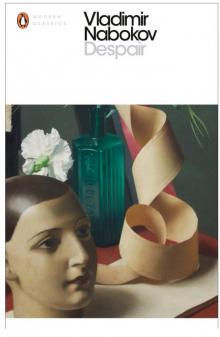 Despair
Despair Mary
Mary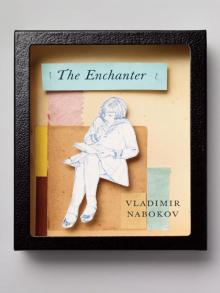 The Enchanter
The Enchanter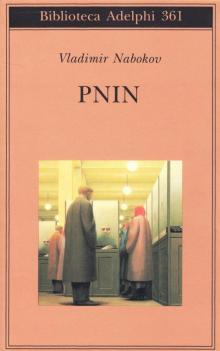 Pnin
Pnin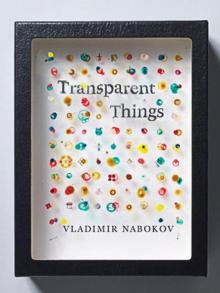 Transparent Things
Transparent Things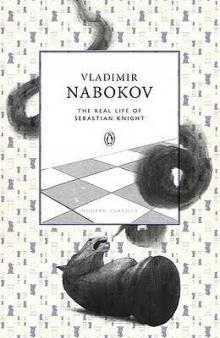 The Real Life of Sebastian Knight
The Real Life of Sebastian Knight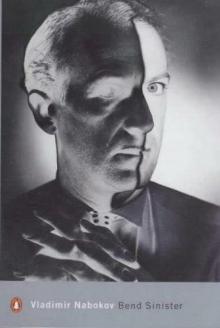 Bend Sinister
Bend Sinister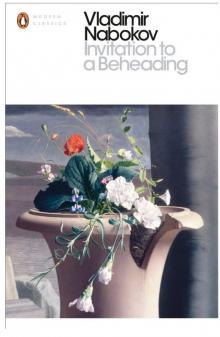 Invitation to a Beheading
Invitation to a Beheading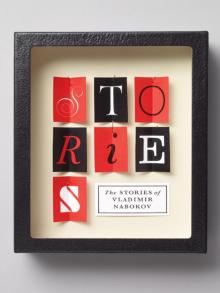 The Stories of Vladimir Nabokov
The Stories of Vladimir Nabokov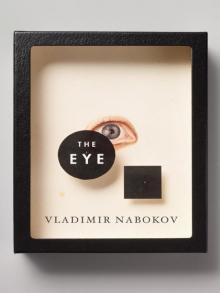 The Eye
The Eye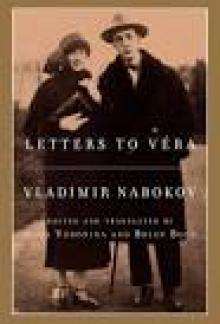 Letters to Véra
Letters to Véra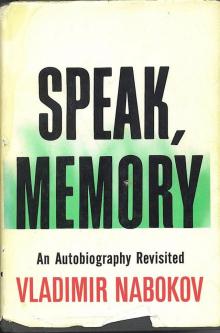 Speak, Memory
Speak, Memory The Gift
The Gift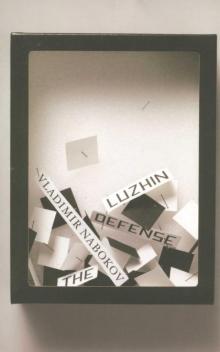 The Luzhin Defense
The Luzhin Defense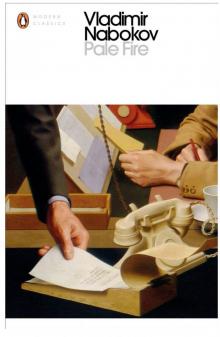 Pale Fire
Pale Fire Glory
Glory Man From the USSR & Other Plays
Man From the USSR & Other Plays Vladimir Nabokov: Selected Letters 1940-1977
Vladimir Nabokov: Selected Letters 1940-1977 Strong opinions
Strong opinions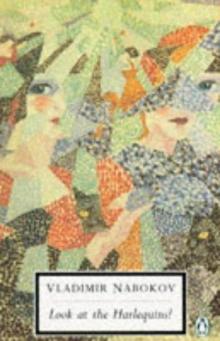 Look at the Harlequins!
Look at the Harlequins!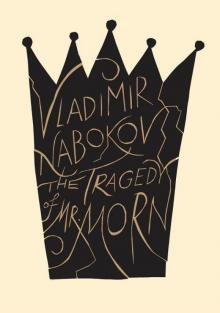 The Tragedy of Mister Morn
The Tragedy of Mister Morn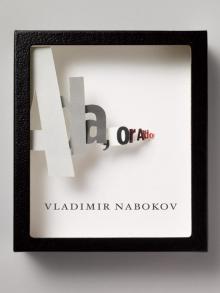 Ada, or Ardor
Ada, or Ardor Lectures on Russian literature
Lectures on Russian literature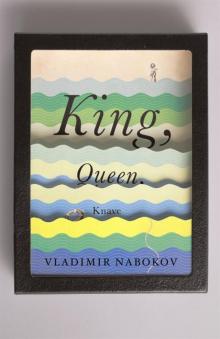 King, Queen, Knave
King, Queen, Knave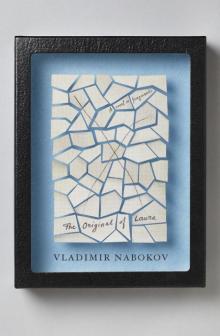 The Original of Laura
The Original of Laura